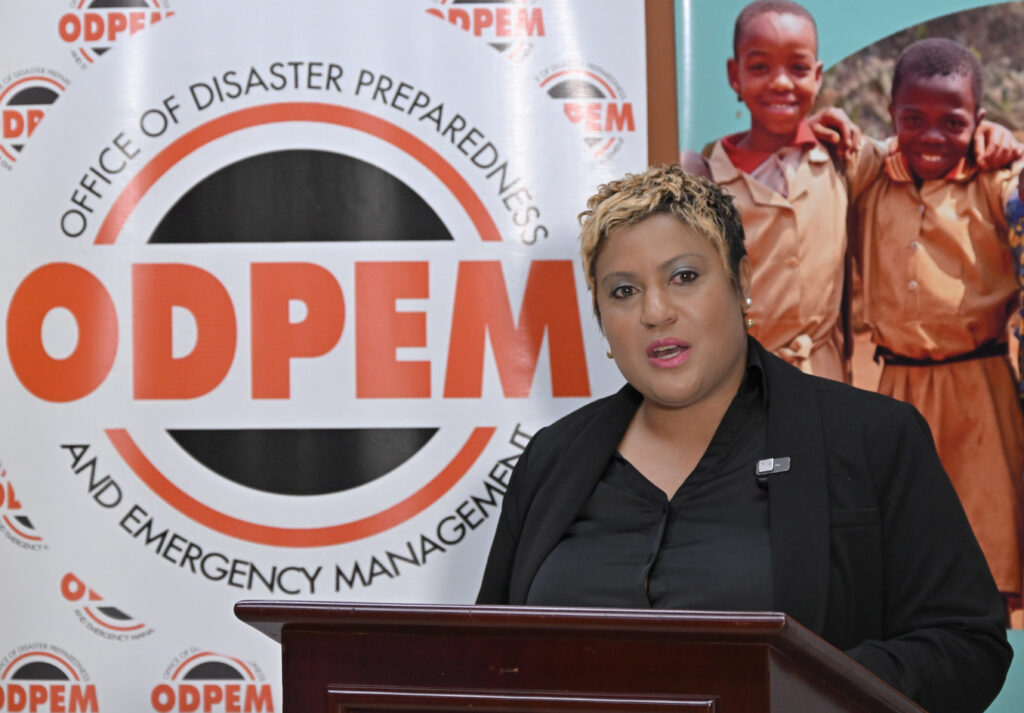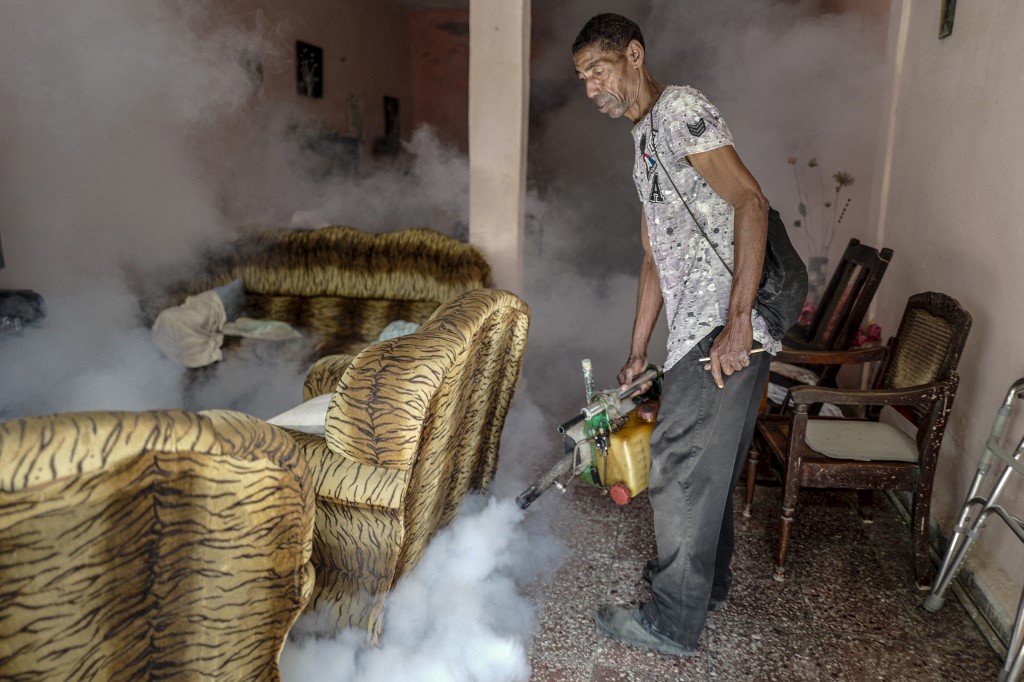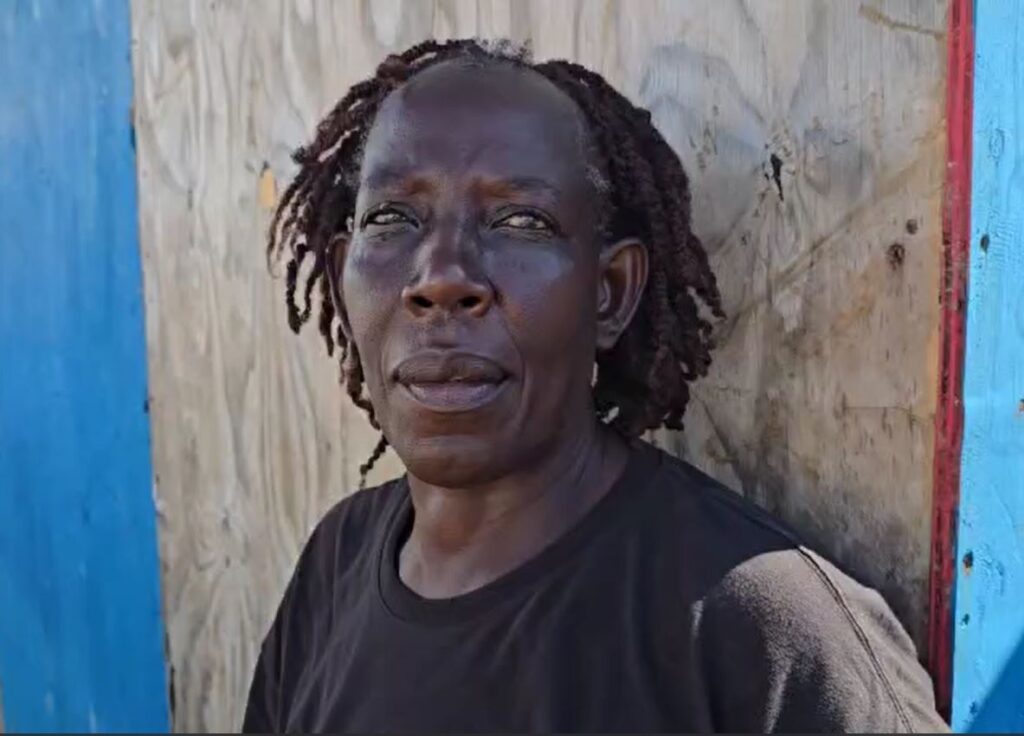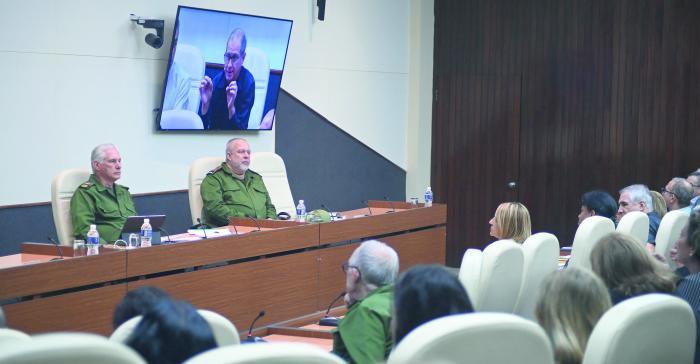In response to the escalating arbovirus epidemic in Cuba, marked by the simultaneous circulation of chikungunya and dengue viruses, President Miguel Díaz-Canel Bermúdez convened a critical meeting with health experts, scientists, and researchers. The session focused on strategies to reduce mosquito infestation rates, enhance treatment protocols, and mitigate the impact of these diseases on the population. Lorena Vázquez Bello, first deputy director of the Pedro Kourí Institute of Tropical Medicine (IPK), emphasized the importance of understanding chikungunya’s clinical manifestations, which differ significantly from other diseases. She highlighted symptoms such as abrupt high fever, severe arthralgia, and arthritis, which often require hospitalization. Preliminary studies of 32 patients at IPK revealed complications including dehydration, acute confusion in the elderly, and neurological issues. To address these challenges, the Ministry of Public Health (Minsap) has approved 26 studies aimed at developing new products and refining treatment protocols. Ileana Morales Suárez, Minsap’s director of Science and Technological Innovation, noted that ongoing research focuses on chronic joint discomfort post-infection, with targeted health interventions planned for vulnerable groups, particularly the elderly. Additionally, efforts are underway to develop diagnostic tests and repurpose existing products like Jusvinza for chikungunya treatment. The meeting also addressed logistical measures, including the repair of fumigation equipment and the production of repellents. These comprehensive actions underscore Cuba’s commitment to leveraging science, medical care, and industry to counteract the current epidemiological crisis and strengthen arbovirus prevention and treatment.
分类: health
-

Ultrabewerkt voedsel vormt groeiend gezondheidsrisico wereldwijd
Ultra-processed foods (UPFs) are increasingly recognized as a significant threat to public health, prompting calls for urgent intervention from international experts. A comprehensive review of scientific studies highlights a dramatic shift in global dietary patterns, with fresh, unprocessed foods being replaced by cheap, heavily processed alternatives. This trend is linked to a heightened risk of chronic conditions such as obesity, diabetes, and even depression. The review, conducted by 43 experts based on 104 long-term studies, identifies associations between UPFs and at least 12 health issues, including cardiovascular disease, kidney disease, and increased mortality. Examples of UPFs include sausages, chips, cookies, sodas, instant soups, ice cream, and many types of supermarket bread. The global consumption of these industrially manufactured products is rising rapidly, leading to poorer overall dietary quality due to excessive sugar, unhealthy fats, and insufficient fiber and protein. Professor Carlos Monteiro of the University of São Paulo, creator of the Nova classification system, emphasizes that UPFs are displacing fresh and minimally processed foods worldwide. Large international food corporations play a pivotal role in this shift, prioritizing profit, aggressive marketing, and political lobbying to avoid stricter health regulations. However, critics of the Nova classification argue that the degree of processing does not solely determine a product’s healthiness. Items like whole-grain bread, breakfast cereals, low-fat yogurt, fish sticks, and baby formula, classified as UPFs, still contain nutrients beneficial to a healthy diet. Statistician Kevin McConway cautions that the observed correlations do not establish causation, and further clinical studies are needed to identify specific components of UPFs contributing to disease. Researchers like Professor Jules Griffin also highlight the benefits of food processing and advocate for more research into its health impacts. Co-author Dr. Phillip Baker of the University of Sydney argues that despite gaps in evidence, immediate action is necessary, akin to global efforts against the tobacco industry. The food industry, meanwhile, maintains that UPFs can be part of a balanced diet, with the Food and Drink Federation noting improvements in recent years, including reduced sugar and salt content. The UK’s Scientific Advisory Committee on Nutrition has described the links between UPFs and adverse health effects as “concerning” but acknowledges uncertainty over whether processing or the unhealthy composition of these products is the primary cause. Current dietary advice remains unchanged: increase consumption of vegetables, fruits, and fiber while limiting sugar, salt, and saturated fats.
-

BOG start nieuwe fase bij 98 -jarig bestaan
The Bureau of Public Health (BOG) in Suriname marked its 98th anniversary on November 18, coinciding with the soft opening of its new headquarters. The event, attended by Health Minister André Misiekaba, highlighted the organization’s pivotal role in the nation’s preventive healthcare system. Minister Misiekaba emphasized that the new building symbolizes BOG’s readiness to confidently embrace the future. ‘This is tangible proof that BOG not only honors its past but is also stepping into the future with conviction,’ he stated. The minister underscored BOG’s foundational role in Suriname’s public health, particularly its Central Laboratory, which played a critical role during the COVID-19 pandemic as the first in the Caribbean to initiate COVID-19 diagnostic capabilities. ‘This achievement was no coincidence but the result of years of dedication,’ Misiekaba added. The new facility, coupled with internal relocations, lays a solid foundation for the decades ahead. The minister also announced an ambitious shift in BOG’s mission, aiming to transform it into Suriname’s leading National Knowledge and Research Institute for Public Health. ‘We are entering a new phase where we will no longer settle for merely recording diseases. BOG must become the intellectual engine behind public health,’ he declared. Acting Director Radjesh Ori reflected on BOG’s evolution over the years, noting its indispensable role in society. ’98 years is a respectable age. BOG has become a household name and is irreplaceable,’ Ori remarked. Minister Misiekaba concluded by emphasizing that true change lies not in infrastructure but in the dedication and expertise of BOG’s staff. Despite ongoing public health challenges, he expressed confidence in the team’s ability to drive scientific transformation. ‘If we embrace this scientific shift, the results—a healthier and more productive Suriname—will be well worth it,’ he said, calling for collective ambition and collaboration to make BOG a proud cornerstone of Surinamese science and public health.
-

Regional Eye Health Strategic Plan Project launched
On October 23, 2025, the Organisation of Eastern Caribbean States (OECS) Commission, in partnership with the Brenda Strafford Foundation (BSF), unveiled the Regional Eye Health Strategic Plan Project during the 11th Council of Ministers: Health meeting. This initiative, supported by the International Agency for the Prevention of Blindness, aims to address critical challenges in eye care across the region, including limited resources, accessibility, and equity. The project aligns with the OECS Heads of Government’s mandate to establish Centres of Excellence in healthcare. A comprehensive fact-finding assessment will be conducted to evaluate eye care needs and capacities within member states, ensuring the development of an evidence-based Regional Eye Health Strategy. Guided by the World Health Organisation’s “Eye Care in Health Systems: Guide for Action,” the initiative will generate robust data to identify prevalent eye conditions, at-risk populations, and targeted interventions. Honourable Philip Telesford, Grenada’s Minister for Health and incoming Chair of the OECS PPS Board, endorsed the project, describing it as a “blueprint for action” that prioritizes equity and integrated, people-centred care. Sisera Simon, Head of the Human and Social Division at the OECS Commission, emphasized the strategy’s role in fostering long-term health resilience. Tony Weeks, President and CEO of the BSF, highlighted the foundation’s commitment to equitable healthcare access and the collaborative efforts to eliminate preventable blindness. The project’s findings will be showcased at the inaugural Global Summit for Eye Health in Antigua and Barbuda in 2026, aligning with Sustainable Development Goal 3 and OECS Strategic Priority 5: advancing Equity and Inclusion.
-

OECS Commission joins Brenda Stafford Foundation to launch regional eye health initiative
On October 23, 2025, the Organization of Eastern Caribbean States (OECS) Commission, in collaboration with the Brenda Strafford Foundation (BSF) and the International Agency for the Prevention of Blindness, unveiled the Regional Eye Health Strategic Plan Initiative during the 11th Council of Ministers: Health meeting. This landmark initiative, sponsored by the BSF, aims to address critical eye care needs across the Caribbean by establishing Centers of Excellence in healthcare, as directed by OECS Heads of Government. The project seeks to overcome resource limitations, enhance access, and promote equity in health services across member nations. A comprehensive assessment conducted by the OECS Commission, with support from the BSF, identified prevalent eye conditions, vulnerable populations, and priority areas for intervention. Drawing inspiration from the World Health Organization’s “Eye Care in Health Systems: Guide for Action,” the initiative will develop an evidence-based strategy aligned with regional and national health priorities. By leveraging detailed epidemiological data, the plan aims to optimize resource allocation and improve health outcomes across the Caribbean. Honourable Philip Telesford, Grenada’s Minister of Health and incoming Chair of the OECS PPS Board, endorsed the project, describing it as a “blueprint for action” that fosters equity and shifts towards a unified, patient-centered approach. Mrs. Sisera Simon, Head of the Human and Social Division at the OECS Commission, emphasized the initiative’s role in strengthening long-term health resilience, calling it a roadmap for measurable goals and collaborative action. Mr. Tony Weeks, President and CEO of the BSF, highlighted the partnership’s four-decade commitment to eye health, noting the region’s determination to eliminate preventable blindness. The initiative aligns with Sustainable Development Goal 3 and OECS Strategic Priority 5, promoting equity and inclusion. Its findings will be presented at the 2026 Global Summit for Eye Health in Antigua and Barbuda.
-

Gov’t intensifying support for pregnant and lactating women to safeguard mothers and newborns
The Jamaican Government is ramping up its initiatives to bolster maternal and child health, ensuring that pregnant and lactating women receive comprehensive care, essential supplies, and vital guidance for safe pregnancies and the healthy development of newborns. Krystal Lee, State Minister in the Ministry of Health and Wellness, announced these efforts during a handover ceremony for WaterStep Bleach Makers at the Office of Disaster Preparedness and Emergency Management (ODPEM) headquarters in New Kingston on Tuesday.
-

Cuba battles virus outbreak despite shortages of food, medicine
Cuba is currently grappling with a severe outbreak of the chikungunya virus, compounded by an unprecedented economic crisis that has led to shortages of essential resources such as clean water, food, fuel, and medicine. The viral disease, which causes debilitating fever and joint pain, has spread across all 15 provinces of the island nation, affecting millions of residents. Elderly citizens like 81-year-old Pilar Alcantara are particularly vulnerable, with many left to endure the illness without access to basic medical care. The situation is exacerbated by concurrent outbreaks of other mosquito-borne diseases, including dengue, Zika, Oropouche, and yellow fever. Francisco Duran, head of epidemiology at Cuba’s public health ministry, reported that over 47,000 cases of chikungunya were diagnosed in a single week, doubling the previous week’s figures. The economic crisis, worsened by U.S. sanctions and the collapse of the tourism sector during the COVID-19 pandemic, has crippled the country’s healthcare system and mosquito control programs. In Havana’s Jesus Maria neighborhood, garbage piles up on the streets due to fuel shortages, while the eastern regions, recently devastated by Hurricane Melissa, face even more dire conditions. Despite Cuba’s historical expertise in medical and pharmaceutical fields, the current outbreak has spiraled out of control due to poor hygiene, accumulated waste, and inadequate water storage practices. As of Thursday, 20 Cubans were reported to be in critical condition due to chikungunya.
-

Movember: Unmasking the silence for men
In a powerful call to action, Dr. Margaret Nakhid-Chatoor, a psychologist and educator, addresses the silent struggles of men in Trinidad and Tobago and beyond. For generations, men have been conditioned to ‘man up,’ to shoulder familial responsibilities, and to mask their vulnerabilities. This societal expectation, while intended to foster resilience, has instead perpetuated a culture of silence, leaving many men to grapple with mental health issues alone.
Movember, an initiative that began in Australia in 2003, serves as a catalyst for change. What started as a playful act of growing moustaches in November has evolved into a global movement aimed at transforming men’s health. The moustache is more than a symbol; it’s a conversation starter, a way to break the silence surrounding prostate cancer, testicular cancer, mental health, and suicide prevention. When someone asks, ‘Why the moustache?’, it opens the door to discussions about health, struggles, and the weight of unspoken pain.
In Trinidad and Tobago, the pressure to remain stoic in the face of unemployment, relationship breakdowns, and loneliness has driven many men to the brink of despair. Rising male suicide rates underscore the urgent need for open dialogue. One young man shared his harrowing experience with anxiety and depression, describing it as a ‘demon inside his head.’ His story is not unique; it reflects the silent battles countless men face daily.
Dr. Nakhid-Chatoor emphasizes that true strength lies not in enduring suffering in silence but in the courage to seek help. ‘Strength is about how much courage it takes to let go of the mask you put on and say, ‘I need help,’’ she writes. Acknowledging pain and vulnerability is not a sign of weakness but an act of bravery. Informal, peer-led spaces, such as gatherings with friends, can be more effective than clinical settings in fostering connection and support.
The message is clear: no one should fight their battles alone. Movember serves as a reminder that every life matters, every voice deserves to be heard, and every pain deserves acknowledgment. Reaching out to men means meeting them where they are—whether in social settings, on the field, or in faith spaces—and reframing mental health as a source of strength and resilience. Simple practices like deep breathing, meditation, and grounding exercises can help manage anxiety and stress, making mental fitness a more acceptable concept.
Dr. Nakhid-Chatoor concludes with a heartfelt plea: ‘The mask of silence has cost too many lives. It’s time to unmask. Take care.’
-

Parottee residents plead for mental health support
In the wake of Hurricane Melissa, which devastated the southwestern region of Jamaica on October 28, residents of Parottee in St Elizabeth are urgently seeking mental health assistance for their community. The category five storm has left not only physical destruction but also deep emotional scars among the populace. Petulia Evans, a local resident, shared her distress, noting the loss of personal belongings and the onset of physical symptoms like hypertension and dizziness. She also observed that many neighbors are visibly traumatized, with some losing weight and others talking to themselves due to the stress and grief. Fisherman Ronnie Bennett highlighted the severe impact on mental health, emphasizing that while relief efforts have provided essential supplies like food and water, psychological support remains critically lacking. Bennett himself suffered significant losses, including his boat and home, which were destroyed by the storm surge. Health authorities have acknowledged the long-term psychological effects of the disaster. Dr. Christopher Tufton, Minister of Health and Wellness, has announced plans to deploy field officers to identify communities in need of psychosocial support, in collaboration with the Pan American Health Organization. Additionally, the Jamaica Psychiatric Association and the Jamaica Psychological Society are mobilizing volunteers to assist in the hardest-hit areas. Dr. Saphire Longmore, a consultant psychiatrist, explained that many Jamaicans are experiencing grief over various losses, including homes, livelihoods, and a sense of security. She described the natural stages of grief that individuals may go through, emphasizing the need for comprehensive mental health support to help the community recover.

